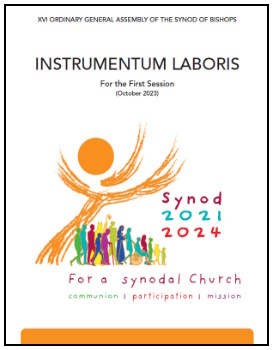 “The call to reform structures, institutions and functioning mechanisms with a view to transparency is particularly strong in those contexts most marked by the abuse crisis (sexual, economic, spiritual, psychological, institutional, conscience, power, jurisdiction). Inadequate handling of abuse cases is often part of the problem, calling into question the mechanisms, procedures and overall functioning of ecclesial structures and institutions, as well as the mindset of people working within them. The search for transparency and co-responsibility also raises fears and resistance; this is why it is necessary to deepen dialogue, creating opportunities for sharing and dialogue at all levels;“
“The call to reform structures, institutions and functioning mechanisms with a view to transparency is particularly strong in those contexts most marked by the abuse crisis (sexual, economic, spiritual, psychological, institutional, conscience, power, jurisdiction). Inadequate handling of abuse cases is often part of the problem, calling into question the mechanisms, procedures and overall functioning of ecclesial structures and institutions, as well as the mindset of people working within them. The search for transparency and co-responsibility also raises fears and resistance; this is why it is necessary to deepen dialogue, creating opportunities for sharing and dialogue at all levels;“
“How can we continue to take meaningful and concrete steps to offer justice to victims and survivors of sexual abuse and spiritual, economic, power and conscience abuse by persons who were carrying out a ministry or ecclesial responsibility?”
“To what extent is it possible to distinguish between the members of an institution and the institution itself? Is the responsibility for mishandling cases of abuse individual or systemic? How can a synodal perspective contribute to creating a culture which prevents abuse of all kinds.”
“How can we create spaces where those who feel hurt by the Church and unwelcomed by the community feel recognised, received, free to ask questions and not judged? In the light of the Post-Synodal Apostolic Exhortation Amoris Laetitia, what concrete steps are needed to welcome those who feel excluded from the Church because of their status or sexuality (for example, remarried divorcees, people in polygamous marriages, LGBTQ+ people, etc.)”
Discussion of these and other questions posed need not be confined to the Rome assembly, as the document is intended for local synodal discussion throughout the church also.

Emotional abuse,which is also spiritual abuse,no less real for being perpetrated for centuries in the name of ‘god’.
https://johnmenadue.com/the-other-form-of-abuse-in-the-catholic-church/
This insensitivity carries over into the irrelevance of so many homilies, into endless dithering and inertia on adult faith formation, and therefore also into the consequent incoherence of the church’s messaging for the young. The clerical ‘club’ is dying in Ireland for want even of male applicants. The structures strangle spiritual and emotional intelligence, so leadership withers on the vine. Empty churches signal a dire need for a radical rethink by the ‘magisterium’, aka for repentance – but will it happen?